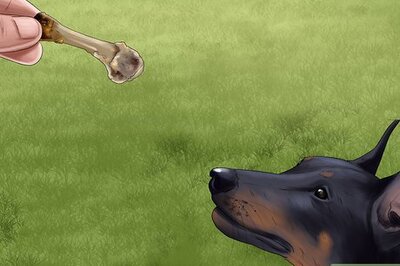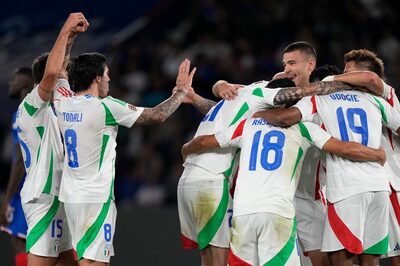
views
Auckland: New Zealand survived the last of an uncanny spate of fly-half injuries to close a cavernous gap in its rugby history, beating France 8-7 in a gripping Rugby World Cup final to become the third team to win the title twice.
Despite being the perennial favorite, New Zealand hadn't won the World Cup since hosting the inaugural tournament in 1987. Two of the biggest losses in knockout matches in the intervening 24 years were to France. This time, the All Blacks held on.
"Marvelous. I'm so proud to be a New Zealander," All Blacks coach Graham Henry said. "It's something we've dreamed of for a while. We can rest in peace."
All Blacks No. 10 Aaron Cruden limped from the field with a knee injury after 33 minutes, joining predecessors Dan Carter and Colin Slade as casualties of the tournament and leaving New Zealand's fourth-choice fly-half, the often vilified Stephen Donald, to sustain its World Cup hopes.
France also lost its starting fly-half, the adapted scrumhalf Moorage Parra, after only 22 minutes in a match of grim physical attrition and his replacement, Francois Trinh-Duc played both the hero and villain as a tense final unfolded.
Donald's international career seemed to have ended when he was held responsible for New Zealand's narrow loss to Australia in Hong Kong last year and he was about to join English club Bath when the All Blacks' fly-half stocks dropped so low he was recalled.
He took over the goal-kicking in the second half and landed a penalty that gave New Zealand an 8-0 lead after it had led 5-0 at halftime. It was critical as New Zealand was left with a one-point margin when France hit back with a 47th minute try, then placed New Zealand under withering pressure throughout the second half.
Trinh-Duc had been discarded by coach Marc Lievremont as France's first-choice fly-half in favor of Parra, whose experience in the position was minimal. By a twist, Trinh-Duc came on in the final in the position he seemed pre-destined to play and became one of its most conspicuous figures as the ball followed him with an almost magnetic attraction.
He twice ghosted through the All Blacks backline, on the second occasion setting in motion the move that led to a try to France's captain Thierry Dusautoir. He also missed a 64th-minute penalty which might have given France its first lead in a bitterly hard-fought match.
France, led magnificently by Dusautoir, placed the All Blacks under grinding pressure throughout the second half but somehow, through the merits of its defense rather than its vaunted attack, New Zealand endured.
And so, 24 years, four months and three days after New Zealand's David Kirk became the first winning captain to receive the Webb Ellis Cup, Richie McCaw displayed the trophy to a crowd of 61,000 at the scene of that first victory, Eden Park.
In McCaw's 103rd test — his 66th as captain — and in Graham Henry's 103rd test as coach, New Zealand finally broke one of world sport's most confounding jinxes, a long history of World Cup favoritism and failure which strained the nerves and the patience of a nation.
McCaw led his players heroically, as the first player to reach breakdowns, as a determined tackler and as a frequent ball-carrier. When he dragged himself from the ground to play on in the 76th minute, bruised and bone-weary after helping New Zealand repel 15 phases of massed French attacks, the crowd cheered him to the echo.
After surviving everything France could throw at them, a penalty in the 79th minute allowed the All Blacks to escape from its own territory and preserve its tiny lead.
The second half reversed the first in which New Zealand had France under pressure. That led in the 15th minute to a try from a lineout to loosehead prop Tony Woodcock and although scrumhalf Piri Weepu sprayed three early kicks at goal, New Zealand built a measurable ascendancy, reflected only in a 5-0 lead at halftime.
Donald made the lead 8-0 with his 45th-minute penalty but France plunged the stadium into silence two minutes later with Dusautoir's try. Weepu kicked the ball into the hands of Trinh-Duc who made a big incision into their territory. Scrumhalf Dimitri Yachvili slipped in taking his infield pass but France moved the ball to the left touchline, then back to midfield where Dusautoir slid over near the posts. Trinh-Duc added the conversion which cut New Zealand's lead to a point.
Somehow, with its back to the wall in the second half of the match, New Zealand survived.
After winning the World Cup at its first attempt in 1987, going through that tournament unbeaten as it did again this year, New Zealand was beaten in the final in 1995, the semifinals in 1991, 1999 and 2003 and in the quarterfinals — by France — in 2007.
Henry was coach and McCaw captain in that 2007 defeat — the earliest exit in New Zealand's World Cup history — and both snatched their chance on Sunday to make a complete and public atonement for that failure. McCaw improved his record as a player to 91 wins from 103 tests and as a captain to 58 from 66 while Henry improved his record as coach to 88 wins and 15 losses — better than 85 percent — and to 11-1 at World Cups.
France became the first team to reach a World Cup final after losing twice in pool play. One of those pool losses was to New Zealand, by 37-17, which helped to make the All Blacks overwhelming favorites on Sunday, though their fans — chastened by past experience — retained a deep-seated apprehension even at kickoff.
France's World Cup campaign had been unsettled by poor performances on the field — losses to New Zealand and Tonga in pool play, a limp 9-8 win over 14-man Wales in the semifinals — and by bickering between coach Lievremont and his players. Against that background, France produced one of its great World Cup performances, defying New Zealand's overwhelming favoritism and matching them in almost every part of the field.
It was only in the last two vital measurements, that of character and desire, that New Zealand managed the slightest edge.




















Comments
0 comment